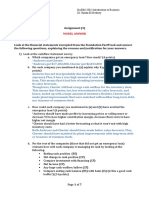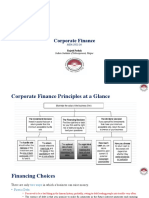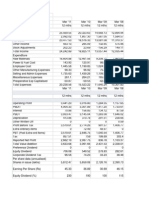Case Study IV Jack Defoe Inc.001
Case Study IV Jack Defoe Inc.001
Uploaded by
barros8811Copyright:
Available Formats
Case Study IV Jack Defoe Inc.001
Case Study IV Jack Defoe Inc.001
Uploaded by
barros8811Copyright
Available Formats
Share this document
Did you find this document useful?
Is this content inappropriate?
Copyright:
Available Formats
Case Study IV Jack Defoe Inc.001
Case Study IV Jack Defoe Inc.001
Uploaded by
barros8811Copyright:
Available Formats
Sebastian Siebel-Achenbach 29 October 2018
ARBUS200 – CASE STUDY IV
JACK DEFOE, INC.
John Davidge’s problem (see the interbranch memo below) is that Jack Defoe has written
cheques for an amount exceeding the money Jack Defoe, Inc. has in its bank account plus the
maximum credit line John has the authority to approve. John honoured those cheques, placing
him in a precarious position with his superior. With Jack out of the country, John’s other choice
was to refuse to honour the cheques, which could have brought down the firm. In placing John
Davidge in this distressing position, Jack Defoe has demonstrated either a lack of business
ethics or a lack of management competence.
In making a lending decision, a banker normally considers four factors that we call the Four Cs.
These are Capacity to repay, Collateral, Character of the borrower, and business Conditions. A
bank normally borrows the money it lends from depositors and purchasers of guaranteed
investment certificates, which are similar to bonds. It then lends this money to borrowers such
as Jack Defoe, Inc. The bank has very little spread between the borrowing and lending rates,
traditionally about three percentage points. Thus it can afford very little risk and must be
comfortable with each one of the Four Cs. Three out of four is not good enough. Following are
explanations of the meaning of the Four Cs.
Capacity to Repay. This refers to the ability of the borrower to generate cash flows
sufficient to pay the interest on the loan and to also repay the principal in a reasonable time
frame.
Collateral. This refers to the amount and quality of the assets the bank takes
as collateral. The collateral can be seized by the bank and sold to recover the interest and
principal of the loan if the loan fails. Having to collect on a loan by resorting to seizing assets of
the borrower is considered a failed loan from the bank’s point of view, and would only be done
as a last resort.
Character of the borrower. This refers to the credit record, demonstrated business acumen
and other personal traits of the person responsible for the interest payments and the loan
repayment, in this case Jack Defoe.
Business Conditions. This refers to the nature and prospects of the business borrowing
the money. The key question is, “Is this a business area in which the bank wants to have its
money? Will this business sector thrive and grow?”
Use these criteria in your evaluation of Jack Defoe, Inc.
2
Bank Interbranch Memo
From: Don James, Loans Manager
Sent: Friday, December 19, 2008 – 2:44 p.m.
To: John Davidge, Branch Manager
Subject: Jack Defoe Inc.
Hello John:
This account has been outstanding for three years without repayment and has grown in the past
year from $6,300 to $27,840 (including overdraft). This account exceeds your $25,000
discretionary limit and must be referred to your Loans Supervisor.
Please forward your file along with your analysis and recommendations on this account.
Don
Background (abstracted from file)
Jack Defoe Inc. is a small business manufacturing components for computer monitors. The
process and production equipment are highly specialised and were developed by the president
and principle shareholder, Jack Defoe. Product quality is reputedly high and the product
commands a premium price.
Despite the premium price, the company has been expanding sales rapidly. It has a significant
market share in North America. Jack Defoe spent time in Europe and Japan this past year and
is enthusiastic about export opportunities beyond North America. He has received token orders.
Until the beginning of 2008, production was carried out in a large double garage. Commencing
about April 1, operations were moved to rented premises in an industrial park. Reason for the
move was insufficient space. At that time most of the fixed assets were replaced because the
old assets could not meet the required production levels. The Company sold the excess fixed
assets for $4,500.
Jack Defoe owns 1,500 shares in Jack Defoe Inc. He is 32 years old and is trained as an
engineering technician. He is married with three children. Substantially all his personal
resources are invested in the business. His wife owns the family home, which is heavily
mortgaged.
Mrs. Anne Defoe, Jack’s mother, owns 500 shares in Jack Defoe Inc. acquired in 2008 in
exchange for a note payable of $18,000. This is believed to be a substantial part of her
personal resources. The conversion was made at our request.
At total of $3,000 in dividends were paid in 2008, to give Mrs. Anne Defoe a small return on her
investment. No dividends were paid in 2006 or 2007.
Jack Defoe is in Japan at this time and cannot be reached before this analysis is due.
REQUIRED: Prepare your analysis, including statements of changes in financial position.
3
4
5
6
You might also like
- Amusement Park Business PlanDocument48 pagesAmusement Park Business PlanNiraj Naik80% (5)
- IB Quick & Dirty Cheat SheetDocument2 pagesIB Quick & Dirty Cheat SheetChavi SinghNo ratings yet
- Accounting Principles: Second Canadian EditionDocument38 pagesAccounting Principles: Second Canadian EditionErik Lorenz PalomaresNo ratings yet
- Summary of William H. Pike & Patrick C. Gregory's Why Stocks Go Up and DownFrom EverandSummary of William H. Pike & Patrick C. Gregory's Why Stocks Go Up and DownNo ratings yet
- Broker Business PlanDocument18 pagesBroker Business PlanJulie Flanagan100% (1)
- Look Before You Leverage!Document2 pagesLook Before You Leverage!cws0829444367% (3)
- Cognovi Labs Case Shukran AlakbarovDocument3 pagesCognovi Labs Case Shukran AlakbarovShukran AlakbarovNo ratings yet
- Jones Electrical DistributionDocument6 pagesJones Electrical DistributionMichelle Rodríguez100% (1)
- Model Answer Assignment 3Document7 pagesModel Answer Assignment 3Nouran Mohamed IsmailNo ratings yet
- Is It Much Ado Nothing? Dividen Policy.Document15 pagesIs It Much Ado Nothing? Dividen Policy.Refi Reyhandi MahardhikaNo ratings yet
- Activity Sheet In: Business FinanceDocument7 pagesActivity Sheet In: Business FinanceCatherine LarceNo ratings yet
- FIN 438 Chapter 14 QuestionsDocument9 pagesFIN 438 Chapter 14 QuestionsDan Andrei BongoNo ratings yet
- Objective To Know About Various Sources of FinanceDocument34 pagesObjective To Know About Various Sources of FinancesangeethamadanNo ratings yet
- Chapter 10 Student Answer Sheet 2020Document2 pagesChapter 10 Student Answer Sheet 2020api-534566718No ratings yet
- New Venture Finance Startup Funding For Entrepreneurs PDFDocument26 pagesNew Venture Finance Startup Funding For Entrepreneurs PDFBhagavan BangaloreNo ratings yet
- Finance Law ExamsDocument23 pagesFinance Law ExamsJohn Paul ChuaNo ratings yet
- Mariotti Esosb4 Im10Document19 pagesMariotti Esosb4 Im10jamesloke09No ratings yet
- DP 4 - 5 Influences On Financial Management ActivitiesDocument8 pagesDP 4 - 5 Influences On Financial Management ActivitiesChristian McLoughlinNo ratings yet
- v6 BMA guideStartNewBank WPDocument5 pagesv6 BMA guideStartNewBank WPvictorade581No ratings yet
- Intro To Business Chapter 10 - Managing The Form of Business OwnershipDocument2 pagesIntro To Business Chapter 10 - Managing The Form of Business Ownershipapi-526065196No ratings yet
- Elizabeth Patrick Assignment 1.2Document2 pagesElizabeth Patrick Assignment 1.2AlexNo ratings yet
- Practice Final With SolutionsDocument8 pagesPractice Final With SolutionsSammy MosesNo ratings yet
- BusFin12 Q1 Mod3 Short and Long Term Funds v2 1Document7 pagesBusFin12 Q1 Mod3 Short and Long Term Funds v2 1jestinetardio7No ratings yet
- Case StudyDocument3 pagesCase StudyAna LuisaNo ratings yet
- Final Paper 1 - SolutionDocument14 pagesFinal Paper 1 - Solutionishujain007No ratings yet
- Entrepreneurship Chapter 11 - Sources of CapitalDocument3 pagesEntrepreneurship Chapter 11 - Sources of CapitalSoledad Perez100% (7)
- ESOPs Provide A Tax Favored Exit Strategy For Business Owners - Pru - IFS-A071585 Ed 02-07Document2 pagesESOPs Provide A Tax Favored Exit Strategy For Business Owners - Pru - IFS-A071585 Ed 02-07Sherwin SatyahadiNo ratings yet
- CH 02Document31 pagesCH 02singhsinghNo ratings yet
- Activity Unit 2Document3 pagesActivity Unit 2tacangbadetteNo ratings yet
- Look Before You LeverageDocument17 pagesLook Before You LeverageBunbun 221No ratings yet
- Ondeck - Partner Program Overview 2013Document7 pagesOndeck - Partner Program Overview 2013api-256998843No ratings yet
- 3.1 & 2 Sources of FinanceDocument20 pages3.1 & 2 Sources of FinanceHanaeNo ratings yet
- Thesis On Sources of FinanceDocument4 pagesThesis On Sources of Financeleslylockwoodpasadena100% (3)
- EMD FundingDocument3 pagesEMD FundingDarnell Woodard50% (2)
- FINC 301 MQsDocument40 pagesFINC 301 MQsMichael KutiNo ratings yet
- Finance NOtesDocument8 pagesFinance NOtescanaldanicajane56No ratings yet
- Business Finance LAS.Q1.WEEK5Document5 pagesBusiness Finance LAS.Q1.WEEK5Jeisha Mae RicoNo ratings yet
- TACN TCNH 2023-Lesson2 PracticeDocument8 pagesTACN TCNH 2023-Lesson2 PracticeThanh Tùng CaoNo ratings yet
- Chapter 10 Student Answer Sheet 2020 1Document3 pagesChapter 10 Student Answer Sheet 2020 1api-545241189No ratings yet
- Corporrtae Finance TheoryDocument18 pagesCorporrtae Finance Theoryayeshaakram322No ratings yet
- 11-Financing the BusinessDocument26 pages11-Financing the Business454365No ratings yet
- ITF 1 Lecture 2. Applying For CreditDocument25 pagesITF 1 Lecture 2. Applying For CreditMarlen ParraguezNo ratings yet
- Financing Decisions-1Document56 pagesFinancing Decisions-1rajniNo ratings yet
- Practice Technicals 3Document6 pagesPractice Technicals 3tigerNo ratings yet
- Dol & DFLDocument17 pagesDol & DFLDannaNo ratings yet
- Preparing A Successful Loan Proposal: Choosing The Right LenderDocument4 pagesPreparing A Successful Loan Proposal: Choosing The Right Lenderu2tom69No ratings yet
- SBDC Counselor Certification Manual MODULE 9 - Sources & Requirements For FinancingDocument24 pagesSBDC Counselor Certification Manual MODULE 9 - Sources & Requirements For FinancingHeidiNo ratings yet
- Msme Week 7 - Finance and Small BusinessFile-1Document54 pagesMsme Week 7 - Finance and Small BusinessFile-1Rahiana AminNo ratings yet
- Sources of Capital PDFDocument5 pagesSources of Capital PDFgowtham raju buttiNo ratings yet
- Week 05 Real Estate LeverageDocument51 pagesWeek 05 Real Estate LeverageEnrico Kyle CacalNo ratings yet
- Raise Your Credit Score 100 PointsDocument9 pagesRaise Your Credit Score 100 PointsJ.D WorldclassNo ratings yet
- Instructions: Patrick - Tay@statecourts - Gov.sgDocument3 pagesInstructions: Patrick - Tay@statecourts - Gov.sgKo ShuNo ratings yet
- 1 - Financial DecisionsDocument9 pages1 - Financial DecisionsByamaka ObedNo ratings yet
- MN2615 T5 Session 2 - Small Business FinanceDocument59 pagesMN2615 T5 Session 2 - Small Business FinanceHaseeb DarNo ratings yet
- TRABAJO F. INT. Y EXT. J.M. ChouqueDocument8 pagesTRABAJO F. INT. Y EXT. J.M. Chouquejosemiguelchoque777No ratings yet
- Fabozzi Ch07Document31 pagesFabozzi Ch07cmb463100% (1)
- Dr. Jones Case StudyDocument2 pagesDr. Jones Case StudyHaironezza AbdullahNo ratings yet
- Company ProfileDocument6 pagesCompany ProfileMd Rakibul HasanNo ratings yet
- Using Successful and Proven Strategies of Credit and Finance, Grants, and Taxation Principles to Obtain Multiple Lines of Credit to Build Your Home-Based Business OpportunityFrom EverandUsing Successful and Proven Strategies of Credit and Finance, Grants, and Taxation Principles to Obtain Multiple Lines of Credit to Build Your Home-Based Business OpportunityRating: 1 out of 5 stars1/5 (1)
- How to Get Funding For Your New Product IdeaFrom EverandHow to Get Funding For Your New Product IdeaRating: 4.5 out of 5 stars4.5/5 (6)
- Short-Sale Pre-Foreclosure Investing: How to Buy "No-Equity" Properties Directly from the Bank -- at Huge DiscountsFrom EverandShort-Sale Pre-Foreclosure Investing: How to Buy "No-Equity" Properties Directly from the Bank -- at Huge DiscountsNo ratings yet
- Summary of Ias 36 Impairment of AssetsDocument3 pagesSummary of Ias 36 Impairment of AssetsenzoNo ratings yet
- Entrep 2nd WarterDocument23 pagesEntrep 2nd WarterLyssaNo ratings yet
- Share Based CompensationDocument5 pagesShare Based CompensationStacy Smith0% (1)
- Toaz - Info Gitman Principles of Managerial Finance 13e PRDocument7 pagesToaz - Info Gitman Principles of Managerial Finance 13e PRRae SoranoNo ratings yet
- VidyaDocument12 pagesVidyaShri KaraleNo ratings yet
- Nickel Pig Iron in China: CommoditiesDocument8 pagesNickel Pig Iron in China: CommoditiesDavid Budi SaputraNo ratings yet
- Group 3 FIN 'C' Literature Review RES301.Document17 pagesGroup 3 FIN 'C' Literature Review RES301.Rajesh MongerNo ratings yet
- Doctrines of Cases in Securities Regulation CodeDocument1 pageDoctrines of Cases in Securities Regulation Codejolly verbatimNo ratings yet
- NPV Formula in ExcelDocument2 pagesNPV Formula in Excelpolobook3782No ratings yet
- 7730239-Retirement of A Partner - WS 1Document2 pages7730239-Retirement of A Partner - WS 1Sandra SanthoshNo ratings yet
- A Bookshop Business PlanDocument33 pagesA Bookshop Business Planomulubiirene100% (1)
- Working Capital and Current Asset ManagementDocument38 pagesWorking Capital and Current Asset Management2021-SC040 PRANAYSAKHARAMDHANDENo ratings yet
- Tutorial 7.7Document6 pagesTutorial 7.7technabooksNo ratings yet
- cs01 2023-03-07Document5 pagescs01 2023-03-07Nebojsa MarjanovicNo ratings yet
- MA2 T2 Fin Risk and ReturnDocument62 pagesMA2 T2 Fin Risk and ReturnMangoStarr Aibelle VegasNo ratings yet
- Short Article On FPODocument2 pagesShort Article On FPOkhushi soniNo ratings yet
- Ratio Analysis: Ratio Analysis: A Ratio Analysis Is A Quantitative Analysis of Information ContainedDocument9 pagesRatio Analysis: Ratio Analysis: A Ratio Analysis Is A Quantitative Analysis of Information ContainedPatnana ArunaNo ratings yet
- ACCA F9 Standard AnswersDocument12 pagesACCA F9 Standard AnswersLai AndrewNo ratings yet
- Idea Cellular (Relative Valuation)Document12 pagesIdea Cellular (Relative Valuation)sarika1828No ratings yet
- Finman2 Material1 MidtermsDocument8 pagesFinman2 Material1 MidtermsKimberly Laggui PonayoNo ratings yet
- CCL Products Initiating Coverage Sep 14 EDEL PDFDocument35 pagesCCL Products Initiating Coverage Sep 14 EDEL PDFrohitkhanna1180No ratings yet
- MC 2022 25 CooperativesDocument79 pagesMC 2022 25 CooperativesRonnell Vic Cañeda YuNo ratings yet
- The Yes Bank CrisisDocument4 pagesThe Yes Bank Crisisgouthami gNo ratings yet
- MovingavregeDocument47 pagesMovingavregeRohit Ajani100% (1)
- Course Outline FIN 421 BRAC University - BBADocument7 pagesCourse Outline FIN 421 BRAC University - BBASaiyan IslamNo ratings yet
- FM QB by Yours - AmitBhai - Volume 2Document230 pagesFM QB by Yours - AmitBhai - Volume 2nnj247896No ratings yet
- Mahindra and Mahindra Profit & Loss AccountDocument13 pagesMahindra and Mahindra Profit & Loss AccountwenemeneNo ratings yet
- FM 42: Investment and Portfolio ManagementDocument39 pagesFM 42: Investment and Portfolio ManagementSarah Jane OrillosaNo ratings yet

























































































